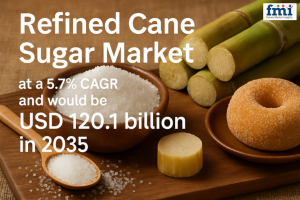Refined Cane Sugar Market to Reach USD 120.1 Billion by 2035 As Rising Demand for Processed Food and Beverage Ingredient
Growing urbanization, evolving dietary preferences, and expanding industrial usage are key factors fueling the global refined cane sugar market.
Refined cane sugar is derived by removing all non-sugar elements from raw cane sugar, resulting in a pure and consistent sweetener. The product’s widespread adoption in bakery, confectionery, dairy, and beverages positions it as a critical ingredient in the global food supply chain. The growing trend toward convenience foods, increased popularity of desserts, and the expansion of the processed food industry have contributed significantly to the increasing consumption of refined cane sugar. Its ease of use, high shelf stability, and compatibility with large-scale manufacturing processes make it indispensable for food producers globally.
In addition, the global availability of sugarcane, particularly in tropical and subtropical regions, provides a stable supply of raw materials for refining. The flourishing dairy sector and heightened preference for sweetened products in developing regions are expected to provide consistent tailwinds to the refined cane sugar industry.
Get a Sneak Peek into the Market – Download a Free Sample: https://www.futuremarketinsights.com/reports/sample/rep-gb-16056
Organic and Non-GMO Refined Cane Sugar Gaining Traction
One of the most prominent trends reshaping the industry is the growing consumer inclination toward organic refined cane sugar and non-GMO sweetener options. With increasing awareness of health and wellness, refined sugar producers are adopting organic farming practices and clean-label processing methods to meet the rising expectations of end-users.
Additionally, the shift toward plant-based, additive-free, and minimally processed foods has further propelled the demand for processed cane sugar free from synthetic chemicals. This shift is particularly evident in developed economies, where consumer preference for non-GMO refined cane sugar is influencing product formulations in confectionery, bakery, and dairy applications.
Expanding Applications Across Food Processing and Confectionery
The refined white sugar industry continues to be a key ingredient supplier for multiple sectors, including food processing, confectionery, and beverages. In particular, refined cane sugar is widely used for flavor enhancement, preservation, texture improvement, and fermentation processes.
Bakeries and dessert manufacturers are especially reliant on refined sugar for consistency and shelf-life extension, while the beverage sector leverages its clarity and solubility properties in soft drinks, juices, and energy drinks. This growing dependence on sugar in industrial applications is a major driver for refined cane sugar demand.
Sustainability and Trade Policies Shaping the Market
The focus on sustainability trends in refined cane sugar production is reshaping the competitive landscape. Industry players are embracing environmentally friendly practices such as water conservation, reduced energy usage, and minimal waste production during sugar refining processes.
Furthermore, sugar trade policies and tariffs are playing a pivotal role in shaping global supply chains. As countries revise import-export norms to protect domestic industries and ensure food security, manufacturers are recalibrating their strategies to remain compliant and competitive in the evolving trade environment.
Stay Ahead with the Complete Market Analysis – Download Full Report: https://www.futuremarketinsights.com/reports/refined-cane-sugar-market
Retail Activity Accelerates in Downtown Sarasota
Showpo Teams Up with Love Island Star Grace Jackson for Femme Fatale Collection
Viviana Puello on the Road: Capturing the Soul of the Artist in Real Time
Więcej ważnych informacji
 Jedynka Newserii
Jedynka Newserii

 Jedynka Newserii
Jedynka Newserii

Handel

Komisja Europejska chce wprowadzić ujednolicone przepisy dotyczące wyrobów tytoniowych. Europosłowie mówią o kolejnej nadregulacji
Ministerstwo Zdrowia opracowało nowy projekt przepisów wprowadzających kolejne zakazy dotyczące wyrobów tytoniowych – całkowitą eliminację e-papierosów oraz zakaz aromatów w woreczkach nikotynowych. Najprawdopodobniej w ciągu kolejnych dwóch–trzech lat Polska będzie musiała implementować nową dyrektywę dotyczącą wszystkich produktów tytoniowych, nad którym niebawem ma rozpocząć prace Komisja Europejska. Europosłowie mówią o ryzyku chaosu legislacyjnego, nadregulacji i wskazują na zagrożenia związane z proponowaną podwyżką akcyzy.
Konsument
Za trzy miesiące ruszy w Polsce system kaucyjny. Wątpliwości budzą kwestie rozliczeń i podatków

Zaledwie trzy miesiące zostały do startu systemu kaucyjnego w Polsce. Kaucje obejmą szklane i plastikowe butelki oraz puszki z napojami. To duża zmiana dla producentów napojów, sklepów i konsumentów oraz pośredniczących w zbiórce operatorów systemów kaucyjnego. Na razie przepisy są na tyle niedoprecyzowane, że budzą wiele wątpliwości w kwestii rozliczania podatków czy rozliczeń z operatorami. Producenci będą musieli płacić podatek od niezwróconych butelek, co zwiększy ich koszty.
Transport
Rośnie skala agresji na polskich drogach. Problemem jest nie tylko nadmierna prędkość, ale też jazda na zderzaku

Za kilka dni zaczynają się wakacje, czyli statystycznie najniebezpieczniejszy czas na drogach. Wśród głównych przyczyn takich zdarzeń na prostych odcinkach drogi są nadmierna prędkość i jazda na zderzaku. Zarządca autostrady A4 Katowice–Kraków w ramach kampanii „Nie zderzakuj. Posłuchaj. Jedź bezpiecznie” zwraca uwagę na zjawisko agresji na polskich drogach i przypomina, że bezpieczeństwo zaczyna się od osobistych decyzji kierowcy.
Partner serwisu
Szkolenia

Akademia Newserii
Akademia Newserii to projekt, w ramach którego najlepsi polscy dziennikarze biznesowi, giełdowi oraz lifestylowi, a także szkoleniowcy z wieloletnim doświadczeniem dzielą się swoją wiedzą nt. pracy z mediami.










.gif)

 |
| |
| |
|